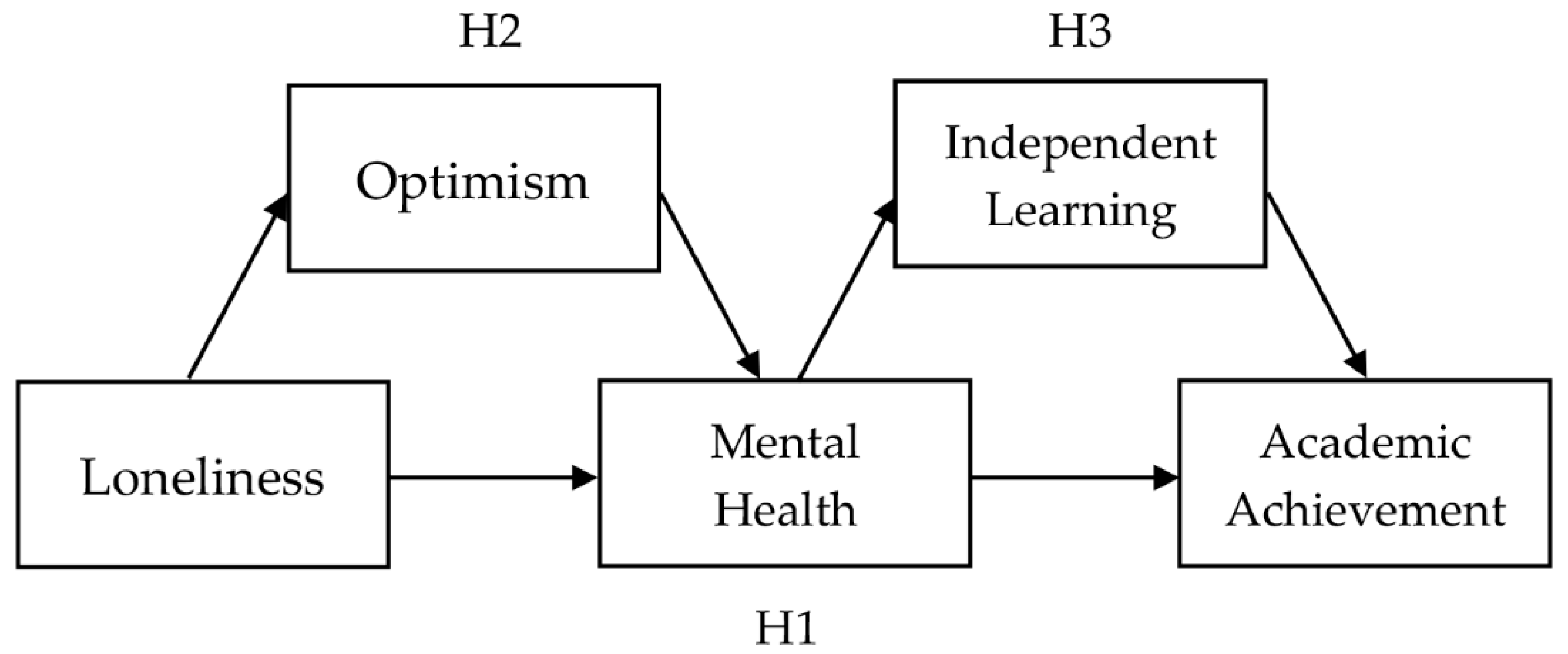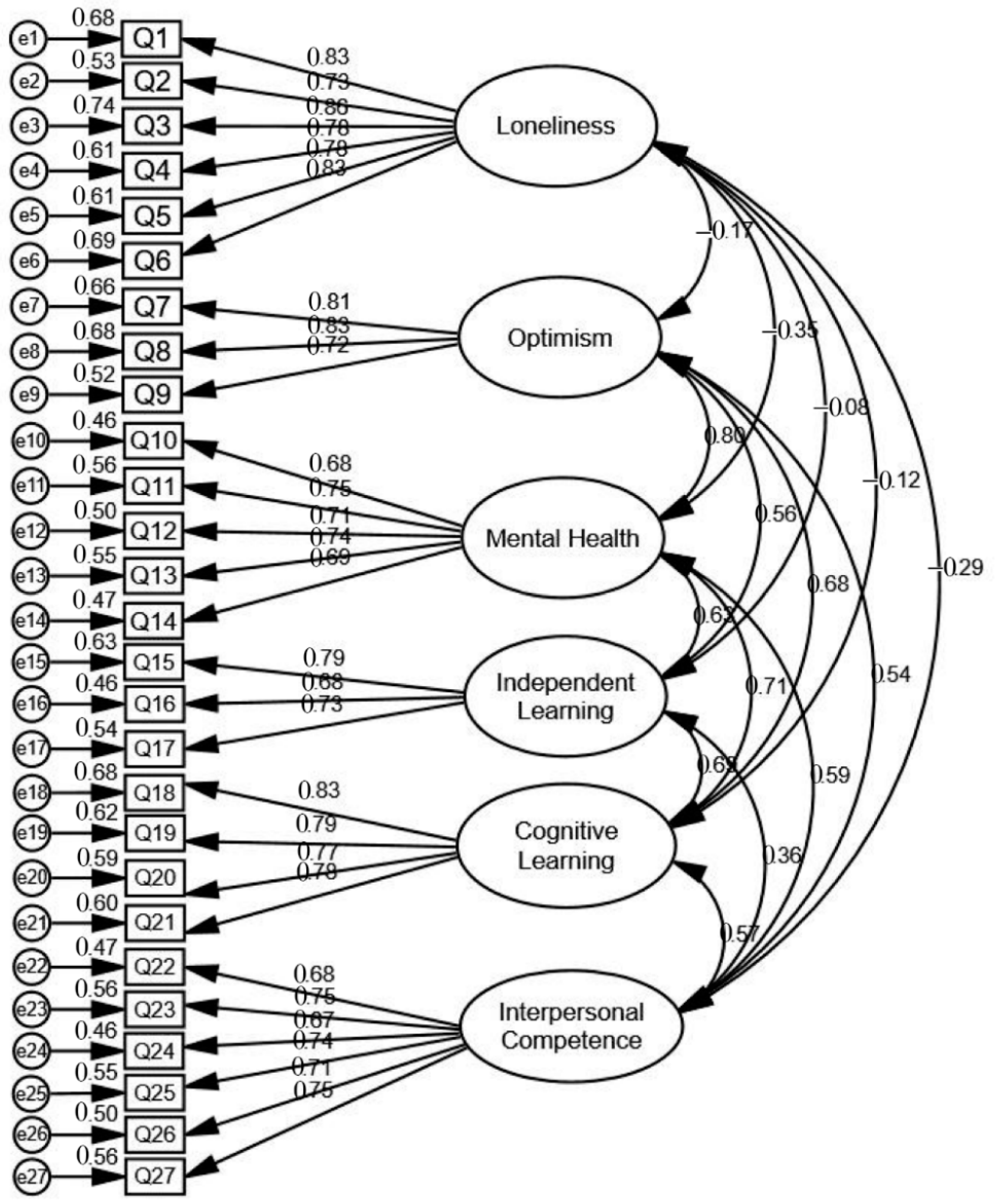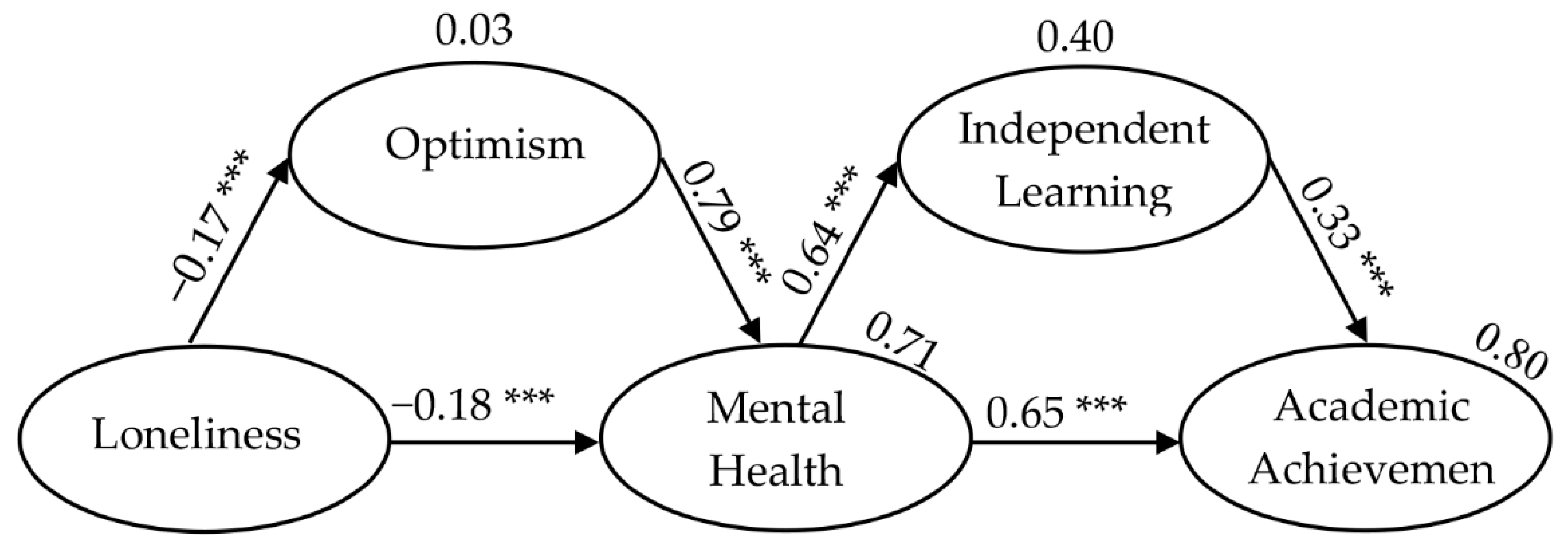Potential Implications of Optimism and Mental Health for the Independent Learning of Chinese University Students
Abstract
:1. Introduction
2. Literature Review and Hypotheses
3. Methods
3.1. Participants
3.2. Measurement Structures
- Loneliness is a subjective experience of isolation that causes emotional stress when learning alone [6,8]. The loneliness scale comprises eight loneliness-related items that measure feelings of isolation caused by a lack of companionship [32]. The eight items jointly determine loneliness with reasonable reliability (Cronbach’s α = 0.89) and factor structure (factor loadings ranged from 0.62 to 0.85 in the EFA). One of the items of the loneliness scale is “I feel left out”.
- Optimism is defined as having positive expectations, with a stress-reduction function [23]. The optimism scale measures positive thinking and expectations through eight optimism-related items [33]. Three items that did not jointly measure optimism were deleted, and the five remaining items could be used collectively to evaluate the measurement structure of optimism (Cronbach’s α = 0.86; factor loadings were between 0.78 and 0.85 in the EFA). One of the items of the optimism scale is “I’m always optimistic about my future”.
- Mental health is viewed as a state of well-being that enables potential realization [22]. Six mental health-related items comprise the mental health scale, which assesses the current cognitive state of self and life [34]. The six items are used to evaluate the structure of mental health (Cronbach’s α = 0.85; factor loadings ranged from 0.66 to 0.80 in the EFA). One of the items of the mental health scale is “I feel that my life is meaningful”.
- Independent learning is active learning through a process of making goals and plans and completing evaluations [28]. The independent learning scale measures active learning management and learning expectations through five independent learning-related items [35]. The five items collectively measure independent learning (Cronbach’s α = 0.81; factor loadings ranged from 0.68 to 0.80 in the EFA). One of the items of independent learning is “I carry out my own study plan”.
- Academic achievement is defined as a learning outcome that requires the competence to develop good interpersonal relationships [5]. The original academic achievement scale with three dimensions evaluates competence in learning, communication, and interpersonal relationships for learners in Chinese higher education through 14 academic achievement-related items [5]. In the EFA, only two dimensions were extracted for the academic achievement scale. Four items of the scale are related to cognitive learning. The remaining 10 items, related to communication and interpersonal relationships, were extracted as a common factor. Following an expert review and the EFA, the 10 items for communication and interpersonal relationships were renamed as “interpersonal competence”. One item related to interpersonal competence was deleted from the cross-factor loading, leaving a total of 13 items used to evaluate academic achievement (Cronbach’s α = 0.91; factor loadings ranged from 0.54 to 0.84). One of the items of the academic achievement scale is “I can easily understand what the teacher said in class”.
3.3. Measurement Structure Evaluation
4. Results
4.1. Main Mediating Structural Model
4.2. Overall Mediating Structural Model
5. Discussion
6. Conclusions
6.1. Research Implications
6.2. Limitations and Future Research
Author Contributions
Funding
Institutional Review Board Statement
Informed Consent Statement
Data Availability Statement
Acknowledgments
Conflicts of Interest
References
- Morris, T.H. Adaptivity through self-directed learning to meet the challenges of our ever-changing world. Adult Learn. 2019, 30, 56–66. [Google Scholar] [CrossRef]
- Yang, B.; Huang, C. Turn crisis into opportunity in response to COVID-19: Experience from a Chinese University and future prospects. Stud. High. Educ. 2021, 46, 121–132. [Google Scholar] [CrossRef]
- Zhang, W.; Wang, Y.; Yang, L.; Wang, C. Suspending classes without stopping learning: China’s education emergency management policy in the COVID-19 outbreak. J. Risk Financ. Manag. 2020, 13, 55. [Google Scholar] [CrossRef]
- Leathwood, C. Gender, equity and the discourse of the independent learner in higher education. High. Educ. 2006, 52, 611–633. [Google Scholar] [CrossRef]
- Yang, D.; Swekwi, U. The influence mechanism of loneliness to learning and its coping strategies in Chinese college students. Int. J. Learn. Teach. Educ. Res. 2021, 20, 68–85. [Google Scholar] [CrossRef]
- Rosenstreich, E.; Margalit, M. Loneliness, mindfulness, and academic achievements: A moderation effect among first-year college students. Open Psychol. J. 2015, 8, 138–145. [Google Scholar] [CrossRef]
- Yalçin, I.; Özkurt, B.; Özmaden, M.; Yağmur, R. Effect of smartphone addiction on loneliness levels and academic achievement of z generation. Int. J. Psychol. Educ. Stud. 2020, 7, 208–214. [Google Scholar] [CrossRef]
- Gerino, E.; Rollè, L.; Sechi, C.; Brustia, P. Loneliness, resilience, mental health, and quality of life in old age: A structural equation model. Front. Psychol. 2017, 8, 2003. [Google Scholar] [CrossRef]
- Akpınar, E. The effect of online learning on tertiary level students mental health during the COVID-19 lockdown. Eur. J. Soc. Behav. Sci. 2021, 30, 52–62. [Google Scholar] [CrossRef]
- Usán, P.; Salavera, C.; Quílez-Robres, A. Self-efficacy, optimism, and academic performance as psychoeducational variables: Mediation approach in students. Children 2022, 9, 420. [Google Scholar] [CrossRef]
- Wang, J.; Lloyd-Evans, B.; Marston, L.; Mann, F.; Ma, R.; Johnson, S. Loneliness as a predictor of outcomes in mental disorders among people who have experienced a mental health crisis: A 4-month prospective study. BMC Psychiatry 2020, 20, 249. [Google Scholar] [CrossRef] [PubMed]
- Ben-Zur, H. Loneliness, optimism, and well-being among married, divorced, and widowed individuals. J. Psychol. 2012, 146, 23–36. [Google Scholar] [CrossRef] [PubMed]
- Bandura, A. Self-efficacy. In The Corsini Encyclopedia of Psychology; John Wiley & Sons: Hoboken, NJ, USA, 2010. [Google Scholar]
- Leung, C.W.; Farooqui, S.; Wolfson, J.A.; Cohen, A.J. Understanding the cumulative burden of basic needs insecurities: Associations with health and academic achievement among college students. Am. J. Health Promot. 2020, 35, 275–278. [Google Scholar] [CrossRef] [PubMed]
- Eisenberg, D.; Golberstein, E.; Hunt, J.B. Mental health and academic success in college. BE J. Econ. Anal. Policy 2009, 9, 40. [Google Scholar] [CrossRef]
- Puskar, K.R.; Marie Bernardo, L. Mental health and academic achievement: Role of school nurses. J. Spec. Pediatr. Nurs. 2007, 12, 215–223. [Google Scholar] [CrossRef]
- Maslow, A.H. A theory of human motivation. Psychol. Rev. 1943, 50, 370–396. [Google Scholar] [CrossRef]
- Ryan, R.M.; Deci, E.L. Intrinsic and extrinsic motivation from a self-determination theory perspective: Definitions, theory, practices, and future directions. Contemp. Educ. Psychol. 2020, 61, 101860. [Google Scholar] [CrossRef]
- Crowley, C.; Kapitula, L.R.; Munk, D. Mindfulness, happiness, and anxiety in a sample of college students before and after taking a meditation course. J. Am. Coll. Health 2022, 70, 493–500. [Google Scholar] [CrossRef] [PubMed]
- Melhe, M.A.; Salah, B.M.; Hayajneh, W.S. Impact of training on positive thinking for improving psychological hardiness and reducing academic stresses among academically-late students. Educ. Sci. Theory Pract. 2021, 21, 132–146. [Google Scholar]
- Farmer, R. Humanistic education and self-actualization theory. Education 1984, 105, 162–172. [Google Scholar]
- WHO. Promoting Mental Health: Concepts, Emerging Evidence, Practice (Summary Report). 2004. Available online: https://apps.who.int/iris/handle/10665/42940 (accessed on 13 February 2022).
- Fitzpatrick, K.M. How positive is their future? Assessing the role of optimism and social support in understanding mental health symptomatology among homeless adults. Stress Health 2017, 33, 92–101. [Google Scholar] [CrossRef] [PubMed]
- Bandura, A. Encyclopedia of Human Behavior; Academic Press: New York, NY, USA, 1994. [Google Scholar]
- Lee, E.E.; Depp, C.; Palmer, B.W.; Glorioso, D.; Daly, R.; Liu, J.; Tu, X.M.; Kim, H.C.; Tarr, P.; Yamada, Y.; et al. High prevalence and adverse health effects of loneliness in community-dwelling adults across the lifespan: Role of wisdom as a protective factor. Int. Psychogeriatr. 2019, 31, 1447–1462. [Google Scholar] [CrossRef] [PubMed] [Green Version]
- Matthews, T.; Danese, A.; Gregory, A.M.; Caspi, A.; Moffitt, T.E.; Arseneault, L. Sleeping with one eye open: Loneliness and sleep quality in young adults. Psychol. Med. 2017, 47, 2177–2186. [Google Scholar] [CrossRef] [PubMed]
- Chang, E.C.; Chang, O.D.; Martos, T.; Sallay, V.; Li, X.; Lucas, A.G.; Lee, J. Does optimism weaken the negative effects of being lonely on suicide risk? Death Stud. 2018, 42, 63–68. [Google Scholar] [CrossRef] [PubMed]
- Tekkol, İ.A.; Demirel, M. An investigation of self-directed learning skills of undergraduate students. Front. Psychol. 2018, 9, 2324. [Google Scholar] [CrossRef] [PubMed]
- Harris, J.L.; Murray, B.J. Educational Grit and psychological trauma. In Proceedings of the Developments in Business Simulation and Experiential Learning, Annual ABSEL Conference, Seattle, WA, USA, 5–8 May 2017; Volume 44, pp. 86–94. [Google Scholar]
- Legault, L. Self-determination theory. In Encyclopedia of Personality and Individual Differences; Ziegler-Hill, V., Shackelfold, T., Eds.; Springer: New York, NY, USA, 2014; pp. 1–9. [Google Scholar]
- Ministry of Education of the People’s Republic of China. Notice on the Issuance of Technical Plans for the Prevention and Control of the New Pneumonia Epidemic in Autumn and Winter in Colleges, Primary and Secondary Schools, and Kindergartens. 2020. Available online: http://www.moe.gov.cn/jyb_xxgk/moe_1777/moe_1779/202008/t20200813_477911.html (accessed on 13 February 2022).
- Hays, R.D.; DiMatteo, M.R. A short-form measure of loneliness. J. Pers. Assess. 1987, 51, 69–81. [Google Scholar] [CrossRef]
- Scheier, M.F.; Carver, C.S. Optimism, coping, and health: Assessment and implications of generalized outcome expectancies. Health Psychol. 1985, 4, 219. [Google Scholar] [CrossRef]
- Yao, G.; Chung, C.W.; Yu, C.F.; Wang, J.D. Development and verification of validity and reliability of the WHOQOL-BREF Taiwan version. J. Formos. Med. Assoc. 2002, 101, 342–351. [Google Scholar]
- Hung, M.L.; Chou, C.; Chen, C.H.; Own, Z.Y. Learner readiness for online learning: Scale development and student perceptions. Comput. Educ. 2010, 55, 1080–1090. [Google Scholar] [CrossRef]
- Byrne, B.B. Structural Equation Modeling Using AMOS: Basic Concepts, Applications, and Programming, 2nd ed.; Taylor & Francis Group: New York, NY, USA, 2010. [Google Scholar]
- Bollen, K.A. Structural Equations with Latent Variables; John Wiley and Sons: New York, NY, USA, 1989. [Google Scholar]
- Bollen, K.A.; Long, J.S. Testing Structural Equation Models; SAGE: Newbury Park, CA, USA, 1993. [Google Scholar]
- Torkzadeh, G.; Koufteros, X.; Pflughoeft, K. Confirmatory analysis of computer self-efficacy. Struct. Equ. Model. 2003, 10, 263–275. [Google Scholar] [CrossRef]
- Verhagen, T.; van Dolen, W. The influence of online store beliefs on consumer online impulse buying: A model and empirical application. Inf. Manag. 2011, 48, 320–327. [Google Scholar] [CrossRef]




| Background Factor | Demographic Characteristic | Group Proportion (n = 509) |
|---|---|---|
| Gender | Male | 245 (48.1%) |
| Female | 264 (51.9%) | |
| Grade | Freshman | 151 (29.7%) |
| Sophomore | 111 (21.8%) | |
| Junior | 130 (25.5%) | |
| Senior | 117 (23%) |
| No | Items | Loadings |
|---|---|---|
| Loneliness | ||
| Q1 | I feel left out | 0.83 |
| Q2 | I cannot find companionship when I want it | 0.73 |
| Q3 | There is no one I can turn to | 0.86 |
| Q4 | I am unhappy being so withdrawn | 0.78 |
| Q5 | I feel isolated from others | 0.78 |
| Q6 | People are around me but not with me | 0.83 |
| Optimism | ||
| Q7 | I’m always optimistic about my future | 0.81 |
| Q8 | Things always work out the way I want them to | 0.83 |
| Q9 | I always look on the bright side of things | 0.72 |
| Mental Health | ||
| Q10 | I feel that my life is meaningful | 0.68 |
| Q11 | I enjoy my life | 0.75 |
| Q12 | I can accept my appearance | 0.71 |
| Q13 | I am satisfied with myself | 0.74 |
| Q14 | I can concentrate (thinking, studying, remembering) on what I want to do | 0.69 |
| Independent Learning | ||
| Q15 | I carry out my own study plan | 0.79 |
| Q16 | I manage time well | 0.68 |
| Q17 | I set up my learning goals | 0.73 |
| Academic Achievement | ||
| Q18 | I can quickly grasp the key to solving the problem | 0.83 |
| Q19 | I can easily understand what the teacher said in class | 0.79 |
| Q20 | I can use the knowledge that I learned flexibly | 0.77 |
| Q21 | I can always understand new knowledge and new skills quickly | 0.78 |
| Q22 | I am willing to take initiative to communicate with others | 0.68 |
| Q23 | I can take care of other classmates very well | 0.75 |
| Q24 | I can communicate with others face to face | 0.67 |
| Q25 | I always take initiative to help other classmates | 0.74 |
| Q26 | I can get along well with other people | 0.71 |
| Q27 | I can cooperate very well with other classmates | 0.75 |
| Mediating Effect | Path Value | Bias-Corrected | Percentile | ||
|---|---|---|---|---|---|
| Lower | Upper | Lower | Upper | ||
| Total effect (L → AA) | −0.16 ** | −0.25 | −0.08 | −0.24 | −0.07 |
| Direct effect (L → AA) | 0.04 | −0.02 | 0.12 | −0.02 | 0.12 |
| Indirect effect (L → AA) | −0.20 ** | −0.29 | −0.14 | −0.28 | −0.14 |
| Mediating Effect | Path Value | Bias-Corrected | Percentile | ||
|---|---|---|---|---|---|
| Lower | Upper | Lower | Upper | ||
| L and MH | |||||
| Total effect (L → MH) | −0.23 ** | −0.33 | −0.15 | −0.32 | −0.14 |
| Direct effect (L → MH) | −0.13 ** | −0.20 | −0.07 | −0.20 | −0.07 |
| Indirect effect (L → MH) | −0.10 ** | −0.17 | −0.04 | −0.16 | −0.03 |
| MH and AA | |||||
| Total effect (MH → AA) | 0.86 ** | 0.69 | 1.03 | 0.70 | 1.05 |
| Direct effect (MH → AA) | 0.65 ** | 0.46 | 0.85 | 0.47 | 0.87 |
| Indirect effect (MH → AA) | 0.21 ** | 0.10 | 0.35 | 0.09 | 0.34 |
Publisher’s Note: MDPI stays neutral with regard to jurisdictional claims in published maps and institutional affiliations. |
© 2022 by the authors. Licensee MDPI, Basel, Switzerland. This article is an open access article distributed under the terms and conditions of the Creative Commons Attribution (CC BY) license (https://creativecommons.org/licenses/by/4.0/).
Share and Cite
Yang, D.; Swekwi, U.; Dai, X.; Tu, C.C. Potential Implications of Optimism and Mental Health for the Independent Learning of Chinese University Students. Sustainability 2022, 14, 10602. https://doi.org/10.3390/su141710602
Yang D, Swekwi U, Dai X, Tu CC. Potential Implications of Optimism and Mental Health for the Independent Learning of Chinese University Students. Sustainability. 2022; 14(17):10602. https://doi.org/10.3390/su141710602
Chicago/Turabian StyleYang, Dong, Usaporn Swekwi, Xiao Dai, and Chia Ching Tu. 2022. "Potential Implications of Optimism and Mental Health for the Independent Learning of Chinese University Students" Sustainability 14, no. 17: 10602. https://doi.org/10.3390/su141710602
APA StyleYang, D., Swekwi, U., Dai, X., & Tu, C. C. (2022). Potential Implications of Optimism and Mental Health for the Independent Learning of Chinese University Students. Sustainability, 14(17), 10602. https://doi.org/10.3390/su141710602






